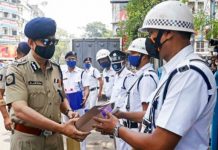Mohammad Asif
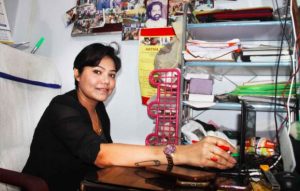 Covid-19 pandemic has taught us some hard lessons apart from changing our lives forever. This deadly virus has completely changed our thought process as well as needs of our survival.
Covid-19 pandemic has taught us some hard lessons apart from changing our lives forever. This deadly virus has completely changed our thought process as well as needs of our survival.
This pandemic has affected all sections of society, making our lives topsy-turvy. But two waves of infections and total lockdown have badly hurt the economically weaker sections. With no work and little or no money in their pockets, they are on the verge of starvation.
 However, some positives of this pandemic are that Good Samaritans have come out in hordes with their helping hands to provide them food, medicine and all support.
However, some positives of this pandemic are that Good Samaritans have come out in hordes with their helping hands to provide them food, medicine and all support.
In West Bengal, when the second lockdown was imposed in May 2021, Astha foundation (NKS Astha) of North Kolkata Shyambazar, had taken an initiative to help people at grassroots level.
Since its birth, the idea of ‘Astha’ was to reach out to the needy. Registered by the Government of West Bengal under the certificate of registration of societies, Astha was formed on 18 January, 2017 at 4A, Srikrishna Lane, Kolkata.
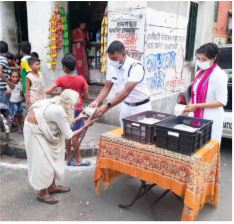 According to ‘NKS Astha’, they were contemplating plans to reach people in need of food for their survival.
According to ‘NKS Astha’, they were contemplating plans to reach people in need of food for their survival.
“We travelled around the city, visited slum areas, red light areas, watched people living on footpaths where malnutrition was a big issue. Most of the marginalised sections of society were facing a tremendous food shortage and needed help,” they said.
“To mitigate the hunger, we decided to cook and distribute home-made food in neatly packed foils and distribute them while maintaining proper hygiene. In our food packets, we offered rice, dal, healthy & protein rich curries, chutney etc. All packets were packed for zero touch transmission.”
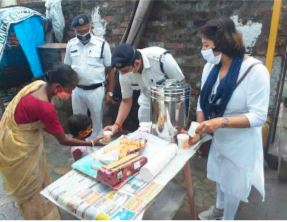 “NKS Astha sought the help of Kolkata Police to reach the needy. Grateful to them as they welcomed our proposal. The pilot project was launched on 27 May, 2021. NKS Astha started their first ‘Meal Distribution’ service of 100 packets from Tala PS on 29 May.
“NKS Astha sought the help of Kolkata Police to reach the needy. Grateful to them as they welcomed our proposal. The pilot project was launched on 27 May, 2021. NKS Astha started their first ‘Meal Distribution’ service of 100 packets from Tala PS on 29 May.
“Overwhelmed by the response and those rare smiles on people’s faces after receiving meal packets, we kept organising it every day and also started distributing dry rations. We also began providing warm milk and biscuits for infants during our food distribution initiative. In fact, we provided milk to more than 250 feeding mothers. Besides, we also organised mass-distribution of face masks and hand sanitizers on roadside across the city,” ‘NKS Astha’ members informed.
According to ‘NKS Astha’, till date, they have covered around 50 police stations of the city.
The members of ‘NKS Astha’ plan to carry forward the drive in all police stations and slums of the city. Though the work started to meet the food scarcity during the Covid-19, they have now decided to make it a full-time mission to be continued throughout the year. ‘NKS Astha’ will be adding more activities in their social campaign. But special thanks to Kolkata Police for their cooperation and association at every step of the mission.
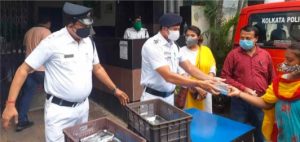 The president of ‘NKS Astha’, as well as secretary of Uttar Kolkata Trinamool Youth Congress, Arpita Dutta, said that they are doing all these activities free of cost. They have sanitized all the police stations, even barracks free of cost, during the first phase of Covid-19. In this period, the KMC was not ready for such service but ‘NKS Astha’ took the lead.
The president of ‘NKS Astha’, as well as secretary of Uttar Kolkata Trinamool Youth Congress, Arpita Dutta, said that they are doing all these activities free of cost. They have sanitized all the police stations, even barracks free of cost, during the first phase of Covid-19. In this period, the KMC was not ready for such service but ‘NKS Astha’ took the lead.
The President of Astha, Arpita Dutta informed, “During my childhood days, my ‘jethima’ [aunty] lived with my parents and she used to do social work, especially for animals and children. If any dog or cat was injured on the street, she used to take care of them by providing medical aid. She also helped a lot of children. I was with her during such social work. Her work has motivated me a lot. I loved her so much, and treated her as my second mother.”
“Inspired by her, I decided to do something in my life. For this reason, I chose to become a social worker,” she added.
Currently, she lives in Sovabazar of Kolkata. Earlier, she used to live at Sibpur Mandirtala area of Howrah, near Nabanno. She did her schooling from Howrah Sibpur Hindu Girls High School and MA from Rabindra Bharati university.
Other than Arpita, Soumen Shaw [secretary] and other executive members of the organisation are playing a great role in the initiative. Despite the presence of many social organisations in North Kolkata, Astha’s work has hogged the limelight during the pandemic.
Arpita said, “I run an ‘Astha Aya Centre’. It is my profession. I spend a part of my earnings on social work.”
She also said, “We decided to do something for those who have actually spent all their lives to secure our future. Our future plan is to build an English medium school with help from Kolkata Police and the Government of West Bengal. This school will be for poor students, who are interested in studying but can’t afford to pay fees. If any well-wisher comes forward and provides their land or unused house, then it will be of great help. Even we appeal to Kolkata Police to arrange the space for the school. For this reason we had approached many places but without success. So, I request everyone to come forward to provide land, and help fulfil our dreams.”
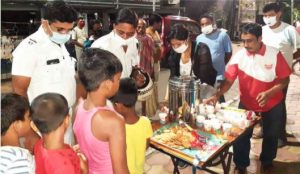 Recalling former Police Commissioner Rajeev Kumar efforts, Arpita said, “He was an inspiring figure. That time, I was working for children, as part of a social work initiative by providing new clothes, umbrellas, books, pencils and food during festivals and other parts of the year. The former CP advised me that for constructive work, take help of Kolkata Police for better reach. In four and a half years of our journey, we have done good work with the help of Kolkata Police. I love children and want to work for them.”
Recalling former Police Commissioner Rajeev Kumar efforts, Arpita said, “He was an inspiring figure. That time, I was working for children, as part of a social work initiative by providing new clothes, umbrellas, books, pencils and food during festivals and other parts of the year. The former CP advised me that for constructive work, take help of Kolkata Police for better reach. In four and a half years of our journey, we have done good work with the help of Kolkata Police. I love children and want to work for them.”
“Recently Kolkata Police approached us to jointly work for the Pronam project. We gladly accepted this proposal of KP and we are ready to provide our best services for members of Pronam,” she added.
Arpita said, “For our gratitude towards Kolkata Police, when we work with them, we do not use our banner so that people could know that this work is being done by the Kolkata Police. We have worked with the KP in remote and slum areas of Kalighat, New Alipore, Taratala, where street children live. It has been a satisfying experience for us.”



